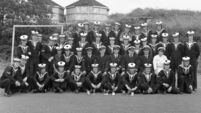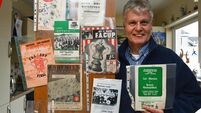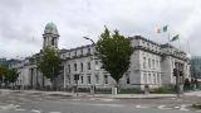A hard-knock life... then my gran won fortune in Hospital Sweepstakes
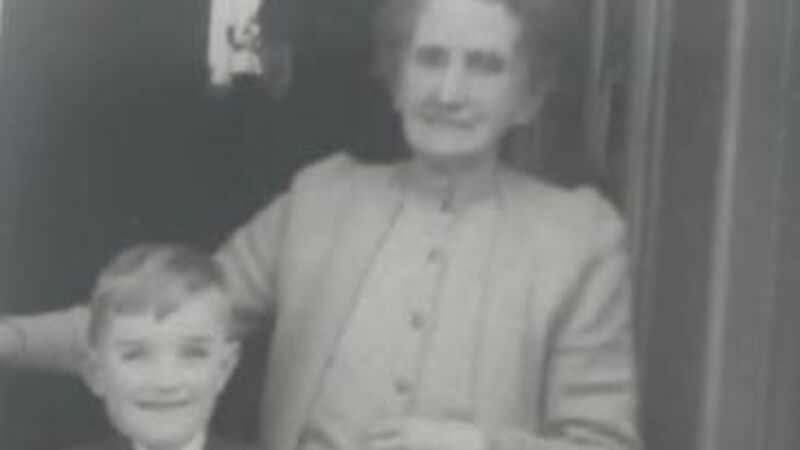
Frances Groëger with her grandson Martin, brother of Kieran, author of this article, on his First Communion Day
FOR most of her life, my granny, Frances Groëger, was down on her luck.
In August, 1916, when she was 33, she suffered a devastating blow when her husband, my grandfather, Gus, tragically died.
He was a GAA referee in an era when the sport was rough, and suffered a kick to the head in a fracas. He passed away soon after in the South Infirmary.
My granny had six children and was pregnant with their seventh - my father, Ambrose.
Frances would live in their family home at 9, The Crescent, on Gardiner’s Hill, Cork city, for another 49 years, and always wore widow’s reeds. She sold almost all of Gus’s GAA medals from his stellar playing career as she strove to raise her children.
One time, a mean neighbour reported her children for being noisy in the street. Frances had to go to court accused of “neglecting to control her children” and was told she could go to jail or pay a fine. Somehow, she found the money to avoid putting her children in care.
It was the era of the industrial school and decades later our dad would often warn us we would be sent to Greenmount if we didn’t behave.
But this isn’t all a story of doom and gloom.
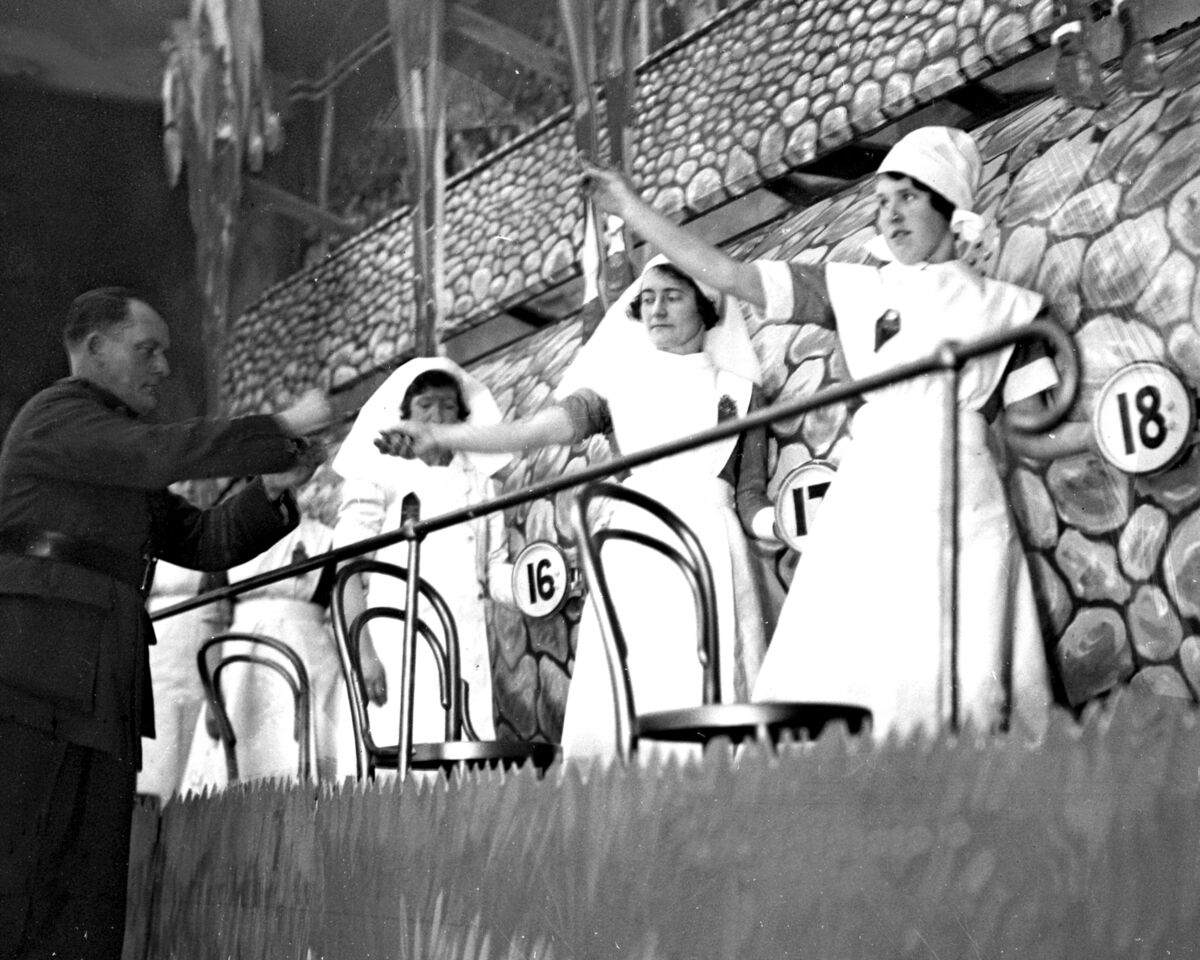
One day, in the late 1940s, my gran had an enormous stroke of luck and won a huge sum in the hugely popular Irish Hospitals Sweepstakes. It didn’t change her life, but it did change her children’s lives...
******
My granny Frances Groëger, nee Newman, was born in 1883.
I got to know her when I was in primary school and my parents decided I should learn a musical instrument.
Unfortunately for him, a certain Mr Moffatt, a music teacher, lived near to my gran in The Crescent, and I was inflicted weekly on the poor man.
He tried hard to teach me the piano, the flute, anything, but I was tone deaf. Eventually, he chose the melodica, a sort of cross between a piano and a tin whistle. At least it stopped me talking and asking questions.
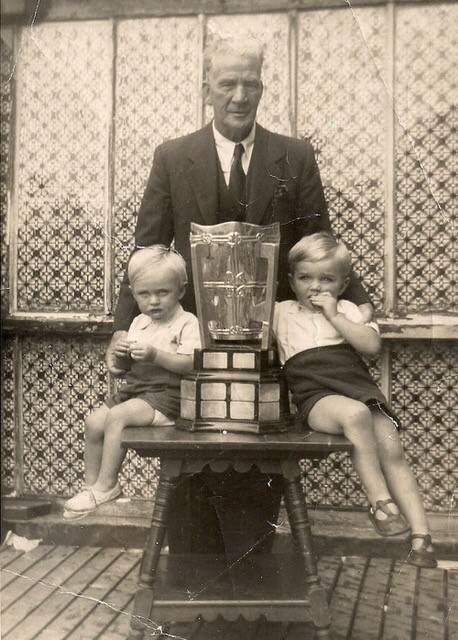
Before those lessons, I would visit my grandmother nearby and pick up bits and pieces of the family story. I regret now not listening more.
I saw a knuckleduster my grandfather Gus had with him when he got that kick in the head as a GAA referee. It was crude - a few brass washers and a slab of metal welded on to them.
I learned how my granny darkened her front rooms to block out light in wartime. The light never came back through them. The house was like a black and white photo, bare and bleak.
Frances ran a little nursery school in the house. Her past pupils remembered her. “She could light cigarettes with her tongue,” a parent of a student I was teaching told me. She didn’t suffer fools gladly!
A highlight of my granny’s life was winning he Irish Hospitals Sweepstake. Older readers might remember it.
It began in 1930 to raise money for Irish hospitals, and ran for 57 years before the lottery replaced it. Draws took place from a huge drum filled with tickets, and a long line of nurses would each draw one and hold it aloft.
In the 1940s, tickets cost ten shillings but you could also buy a quarter share for a half crown.
The number of tickets drawn corresponded to the number of horses down to run in a horse race in Ireland or the UK, such as the Grand National at Aintree. That could be 70 horses!
If you were lucky enough to draw a horse, that was one thing, but to win the Sweepstake your horse had to win or be placed in the race too.
I don’t know exactly when my granny won the Sweep, probably the late 1940s. Her horse was the favourite and won. We were told she sold shares in her ticket.
We don’t know exactly how much she won, but she gave each of her seven children £3,000 - the equivalent of €150,000 today!
With his windfall, my dad bought the Black Cock pub in Blackpool. He later sold it and bought a share of Moore’s Hotel on Morrison’s Island in Cork city. The hotel belonged to my maternal aunt, known as Miss Deasy, and my brother Martin and I had our photo taken in there once when we were young with the MacCarthy Cup, alongside Cork trainer Jim Barry.
I have no memory of my parents living anywhere but Moore’s Hotel. My mother even cooked her own wedding breakfast there. Both she and my father took courses at the School of Commerce around the corner.
My dad loved sport, like his father, and at weekends we went to Blackrock to watch him play hockey for Belvedere.
He started working life as an apprentice welder in the Spade Mill at Monard. The sport you played then was decided by when you had a half day. On his half day, hockey was the only option and there was no Catholic club, so they founded their own. It is still going strong!
We went to primary school in Fitton Street East, where Cork Dry Gin was bottled. The fumes sent the women workers sky high, all you heard all day were howls of laughter from the open doors onto the street!
I went on to Coláiste Íosagáin, Ballyvourney, a de la Salle boarding school. One Monday in 1965, I was called out of class by a Brother who said I had a phone call - the only one I got in six years there. Few houses had fixed lines. Dad was on the phone. “We buried granny today.” That was it.
Frances Groëger died on Saturday, March 6, 1965. I was not brought home for her funeral. I walked back to class in a daze. It wasn’t the way I wanted it to end.
I came home for Easter a few weeks later and went with my dad to clean out granny’s house. Everything went into a small skip. I would dearly have loved to have kept some items but dad would not let me. I really wanted that knuckleduster!

When we had finished, my father sat on the step of the front door and sobbed. The only time I ever saw him cry. For him it was the end of an era.
******
By now, you might be wondering at my surname - it is German. Anthony August Groëger came to Ireland in the 1870s.
It may be family hearsay, but I was told a boat-load of Germans was heading to New York, but it dumped the passengers in Cobh and sailed off. Two brothers on board pooled their resources; one went on to New York, the other booked in the Camden Hotel on Camden Quay. That was Anthony August Groëger, my great-grandfather, a watchmaker.
He wed Kate Hurley, daughter of the owner of the Camden Hotel, and they had three children - Pauline, in 1878; William, in 1879; and my grandfather Gus, in 1881. Anthony died in 1882. As an aside, Pauline was the mother of Gus Healy, Lord Mayor of Cork and a TD after whom the swimming pool in Douglas is named.
William and Gus Groëger were sport-mad and played on several teams together, including Gaelic football for southside club Nils.
In 1904, Gus took part in the Blackrock Nils Tournament as captain and won a medal.
By 1906, a ban on participating in ‘foreign’ sports had caused a split in the Nils football Club and the William O’Brien football Club emerged.
The Cork Examiner of December 4, 1906, stated Gus and William were on the Tournament Committee of the William O’Brien Club. William began to concentrate on rugby while Gus stayed with GAA. He became a referee and a member of the Cork County Board when his playing career ended.
When Gus died in 1916, tributes in the Cork Examiner referred to “numerous friends” feeling “deep regret” at his death. Cork County Board and Nils also paid tribute.
******
My grandfather, Gus Groëger, seems to be following me around in recent years.
In 2018, Community Radio Youghal produced a programme on letters home from World War I, and Youghal Little Theatre provided the readers. One got sick and I was asked to fill in.
A group of us sat at a table and letters were handed out randomly for us to read. I was given one and realised, by bizarre coincidence, that it had been written to my grandfather by his brother William, who fought at Suvla Bay in Gallipoli in World War I.
A Turkish shell blew a piece of William’s skull off, but they sewed a piece of tin, part of a mess bowl, onto his head until he got home. My granny showed it to me once. It saved his life.
There was no way the radio station could have known the connection. Just a coincidence?
Another time, a relation, Greta Newman, was moving house and found a broken brooch in a drawer. It was that football medal won by Gus with Nils 1904.
Greta said I should have it, and I offered it to the National Treasures Digital Museum TV programme fronted by Cork’s John Creedon. A viewer in Blackrock saw the Groëger name and contacted me to say he had found a silver football in his garage presented by Nils “as a token of esteem” to Gus Groëger in 1906. He thought I should have it.
Another coincidence?
Then, last year’s Holly Bough featured a massacre on Maylor Street in 1914 (P94-95), when a man killed his wife and children and then himself. A passer-by who contacted the police was named as one Gus Groëger...
